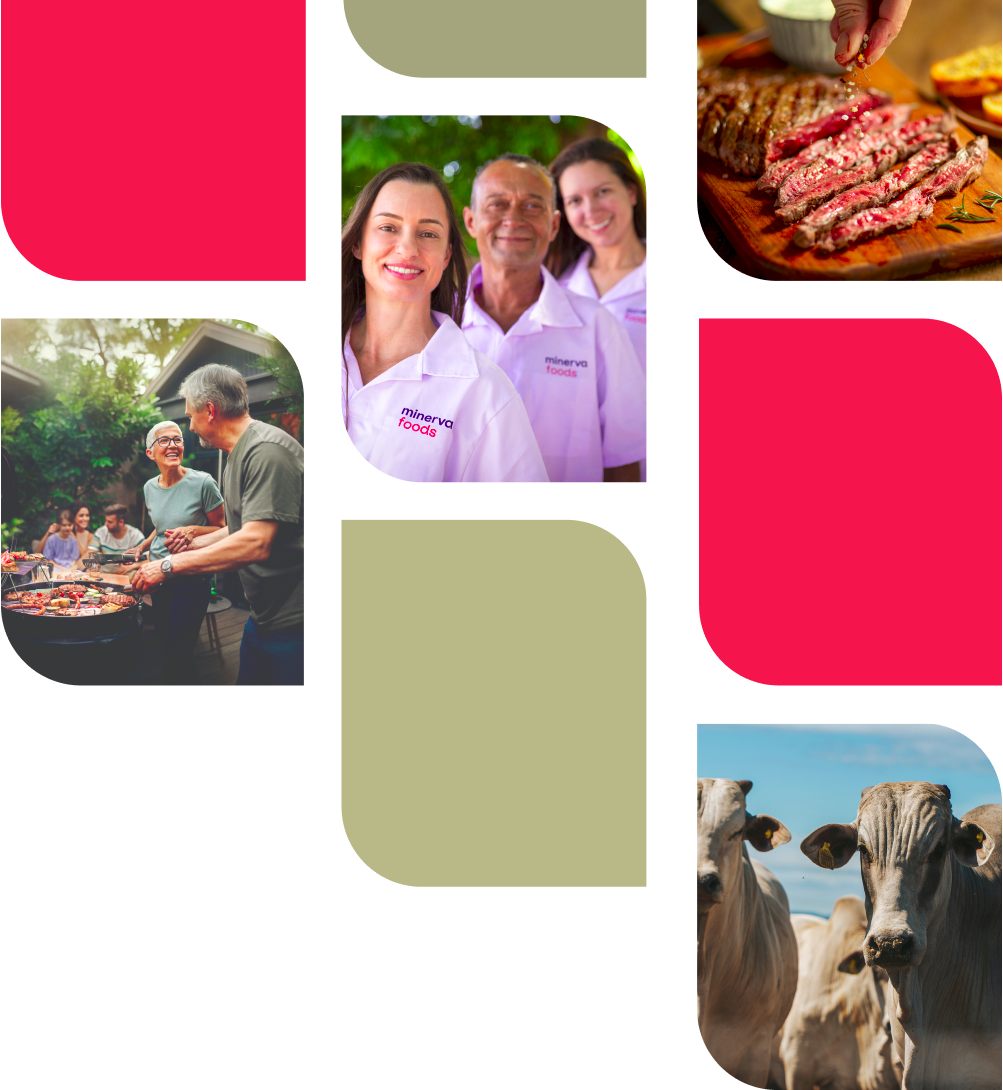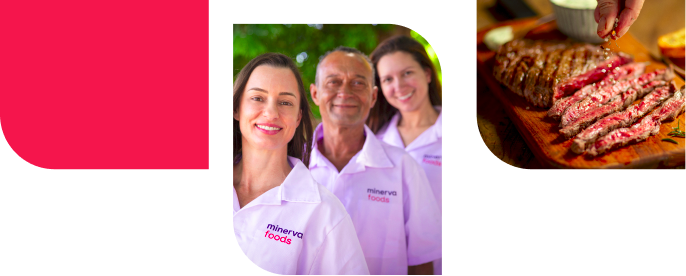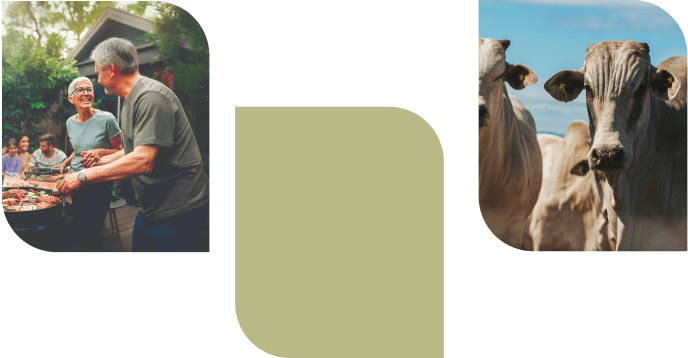

Frequently Asked Questions

-
Animal Welfare
-
Minerva Foods conducts Animal Welfare Management in a structured manner, both in its operations and throughout its supply chain. Supporting documents include the Animal Welfare Policy, which recognizes animals as sentient beings and defines the Company’s stance, and the Antibiotic Use Policy, which raises awareness about the prudent use of medications to prevent antimicrobial resistance. Practices follow the Five Domains of Animal Welfare and include audits, team training, and indicator monitoring. Additionally, through the BEA+ Minerva program, the Company engages suppliers by promoting awareness, training, and performance monitoring to ensure alignment with ethical, sustainable standards and corporate policies.
-
Minerva Foods is part of national and international animal welfare coalitions, including the Brazilian Animal Welfare Collaboration (COBEA) and the Global Coalition for Animal Welfare (GCAW). COBEA is a pre-competitive collaboration initiative that brings together different links in the animal protein chain and stakeholders in Brazil to promote progress in animal welfare and encourage alignment on priority topics. GCAW is a global platform that brings together companies and experts to discuss and align best practices in animal welfare, seeking ways to make them effectively applicable in production.
-
Minerva Foods publishes its animal welfare progress through the Animal Welfare Report, which presents indicators from its own operations and supply chain, describes awareness actions, data collection and analysis, goal tracking, public commitments, and other strategic engagement initiatives. The document allows transparent monitoring of progress and highlights the company’s commitment to integrating animal welfare practices into operations and supply chain management.
-
The Welfair® certification is an independent and internationally recognized seal that attests to the adoption of rigorous animal welfare practices on farms and slaughter units. It is based on four principles (adequate feeding, good health, environmental comfort, and natural behavior) and twelve criteria that assess aspects such as nutrition, hygiene, handling, healthcare, social interaction, and expression of natural behaviors. Minerva Foods was the first beef company in Latin America to obtain the seal, reinforcing its commitment and pioneering role in ethical and scientific excellence in animal welfare standards.
-
Yes. In 2023, Minerva Foods publicly announced 54 animal welfare commitments for its entire supply chain, covering topics such as antibiotic use, intensive confinement, environmental enrichment, mutilation practices, long-distance transport, pre-slaughter stunning, certifications, and other aspects considered essential for animal welfare. The fulfillment goals for these commitments range from 2023 to 2045, and a detailed description of each, along with the current status, is available in Section 8 of the Animal Welfare Report.
-
Minerva Foods’ Public Commitments cover all species in the supply chain, including cattle, sheep, pigs, broiler chickens, fish, laying hens, and dairy cows. The Company works to ensure that animal welfare principles are consistently applied throughout the chain.
-
Environment
-
The primary goal of the Commitment to Sustainability is to guide Minerva Foods in its transition toward a low-carbon economy, with the ultimate objective of achieving net zero emissions by 2035—15 years ahead of the target set by the Paris Agreement. To reach this goal, the company has established targets across three main focus areas:
1. Eco-efficiency in controlled operations:
2. Preventing illegal deforestation across the value chain:
3. Developing the Renove program in partnership with cattle ranches:
For more details, please visit the Commitment to Sustainability section to access the full document and track Minerva Foods’ progress.
-
All Minerva Foods operations fall under the company’s Environmental Management System (EMS), which addresses the environmental impacts and risks associated with its activities on natural resources and biodiversity. The EMS includes preventive and mitigation measures, along with continuous improvement initiatives. This management approach covers licensing, concessions, investments, and the implementation of Environmental Management Plans (EMPs) and Solid Waste Management Plans (SWMPs).
-
All Minerva Foods business units operate in compliance with the requirements of municipal, state, and federal regulatory agencies. Adherence to these regulations helps reduce operational risks and ensures environmental responsibility.
In addition, annual reviews of environmental aspects and impacts help management address and mitigate significant risks.
-
Yes. Minerva Foods tracks multiple environmental indicators on a monthly basis, and these results are reported annually in the company’s Sustainability Report. The data collected supports the development of strategies and investments that optimize the use of natural resources and improve eco-efficiency across operations.
These indicators can be found in the Indicators section.
-
Yes. Since 2021, Minerva Foods has held the Eureciclo seal, which certifies its reverse logistics practices and the offsetting of 50% of the packaging it places on the market in Brazil.
In Colombia, the company has directed more than 170 tons of packaging and other recyclable materials to the Punto Azul program. This initiative promotes responsible management of post-consumer waste and encourages recycling and circular economy practices by forming partnerships with other companies.
In Australia, Minerva Foods complies with public recycling policies and develops action plans focused on waste management.
In addition to recycling, the company works to reduce material consumption and manage waste responsibly in accordance with its Solid Waste Management Plans (PGRS). Additionally, Minerva Foods reuses industrial byproducts through its Minerva Leather, Biodiesel, Ingredients, and Casings operations, ensuring the full utilization of its primary raw materials.
-
Minerva Foods’ Corporate Greenhouse Gas Emissions Inventory is updated annually and covers Scopes 1, 2, and 3 emissions. The inventory is independently audited and published in the Brazilian GHG Protocol Program’s Public Emissions Registry. In 2024, Minerva Foods received the program’s Gold Seal for the fourth consecutive year, recognizing the company’s transparency and consistency in emissions reporting.
In addition, Minerva Foods encourages its cattle suppliers to adopt low-carbon, regenerative agricultural practices through the Renove Program.
-
Yes. In 2021, Minerva Foods announced its Commitment to Sustainability, with a strong focus on combating climate change and illegal deforestation. As part of this commitment, the company has set clear goals: 1) reduce GHG emission intensity by 30% (Scopes 1 and 2) by 2030, based on a 2020 baseline, and 2) achieve carbon neutrality by 2035, which is 15 years ahead of the Paris Agreement target.
-
Launched in 2021, Renove is a Minerva Foods initiative that promotes regenerative ranching practices aimed at increasing productivity and profitability for cattle ranchers, while generating environmental benefits through reduced carbon emissions and sustainable livestock intensification.
The program is built on three core pillars:
– Training and Technical Assistance: Renove offers training, technology transfer, and on-site rural support to help technicians and ranchers adopt and maintain regenerative practices.
– Green Finance: In partnership with financial institutions, the program provides access to special credit lines that reward ranchers committed to sustainable production.
– Technical and Institutional Partnerships: Renove collaborates with leading companies and institutions across South America, applying science-based methodologies that are recognized internationally.
-
MyCarbon is a Minerva Foods subsidiary dedicated to generating and trading carbon credits, transforming production chains, and contributing directly to the fight against climate change.
The company has a specialized team that helps ranchers adopt sustainable and efficient agricultural practices. This supports production intensification and optimizes the use of natural resources. MyCarbon bridges the carbon market and rural producers, generating high-quality, traceable, and reliable carbon credits. These credits help major emitters meet their decarbonization goals, aligning economic activity with global environmental standards.
-
The Zero Carbon Impact – Responsible Sourcing line features products sourced from ranches audited and monitored through the Renove Program. These ranch operations, along with their associated processing facilities, implement emission-reduction plans as part of the program. Since its inception, the initiative has exported carbon-neutral beef to customers in the United States, Spain, Italy, Chile, and other markets. Emissions are offset through carbon credits generated by reforestation and forest preservation projects marketed by MyCarbon, a Minerva Foods subsidiary.
-
Minerva Foods uses the SMGeo geospatial monitoring platform, developed by Niceplanet Geotecnologia, to monitor 100% of its direct cattle suppliers in Brazil, Paraguay, Colombia, Argentina, and Uruguay. This monitoring process incorporates socio-environmental criteria specific to each country and complies with local legislation and the company’s Agricultural Commodities and Livestock Products Procurement Policy.
-
The socio-environmental requirements applicable to Minerva Foods’ operations are detailed in the Agricultural Commodities and Livestock Products Procurement Policy. These criteria take into account each country’s legislation, timelines, legal frameworks, and land boundaries where Minerva Foods operates.
-
Cattle suppliers are evaluated daily for every purchase transaction. In line with the Procurement Policy, Minerva Foods maintains zero tolerance for noncompliance. If any guideline in the policy is breached, the supplier is immediately blocked and removed from the list of approved suppliers.
-
Yes. In accordance with the company’s public commitments and the socio-environmental criteria established for each country where it operates, Minerva Foods conducts annual audits performed by independent third-party entities. These audits verify the effectiveness and compliance of the company’s monitoring systems.
All audit reports are publicly available in the Dedication to the Planet section.
-
Among the tools used are SMGeo Prospec® and Visipec®. The SMGeo Prospec® application, developed by Minerva Foods in partnership with Niceplanet Geotecnologia, enables producers to monitor their own suppliers through socio-environmental analyses that use the same geospatial monitoring technology applied by the company. The Visipec tool, created by the National Wildlife Federation (NWF) and the Land Use and Environment Lab at the University of Wisconsin–Madison, identifies potential risks in the Amazon by cross-referencing Rural Environmental Registry (CAR) data with public databases and tracking cattle movements.
Additionally, Minerva Foods has implemented protocols to ensure traceability and socio-environmental monitoring of animals, including one that focuses on individually identified cattle. Under this protocol, each animal is tracked using the official SISBOV numbering system. Certification companies accredited by MAPA (Ministry of Agriculture, Livestock, and Supply) conduct the verification process and issue certificates of traceability and socio-environmental compliance. In 2023, this protocol enabled the shipment of the first 100% traceable leather in Brazil, certified by SBCert, reinforcing Minerva Foods’ leadership in sustainable and transparent livestock sourcing.
-
Reconecta is a Minerva Foods initiative that provides technical support and practical guidance to help suppliers who were blocked for noncompliance regain eligibility under the company’s Procurement Policy. Key reinstatement measures may include updating the Rural Environmental Registry (CAR), developing and implementing environmental reforestation plans, and settling environmental liabilities with IBAMA.
-
The first step is to identify the type of liability found. Once that’s determined, Minerva Foods can work with you to find the most appropriate solution, whether by offering technical support or guidance on how to engage the relevant government agency.
-
The processing time for each analysis varies depending on the complexity of the case. To check the status of your request, please contact our team at pecuariasustentavel@minervafoods.com.
-
You may use your assessment to request a correction directly from the responsible agency. This is an important step toward resolving the issue and becoming eligible to supply to Minerva Foods again.
-
Food Quality and Safety
-
Yes. Minerva Foods maintains and renews certification under the Brand Reputation Compliance Global Standards (BRCGS), one of the most stringent global food safety benchmarks. The company strives for the highest possible results and does not accept ratings below A or AA.
The BRCGS protocol harmonizes food safety standards across the supply chain and is required by major retailers, manufacturers, and food service organizations worldwide. This certification ensures that Minerva Foods products are safe, compliant, and of the highest quality. Compliance is verified through independent third-party audits.
Learn more about all our certifications.
-
Minerva Foods adheres to a rigorous food quality and safety management system based on its Integrated Management System policy and the laws and regulations of the countries in which it operates. The company’s food safety approach is based on a matrix of quality indicators that technical teams monitor daily as part of a continuous improvement process. Additionally, Minerva Foods conducts weekly, monthly, and annual evaluations to track the performance of each production unit, ensuring consistent product quality and safety.
-
Minerva Foods operates its own ISO 17025–accredited laboratories and partners with third-party laboratories that meet the same standards. The company conducts microbiological and physicochemical analyses to verify that products are safe and free from pathogenic contamination. When necessary, tests are also performed to confirm product composition—such as protein, fat, and moisture levels—to meet customer specifications and legal requirements.
-
Governance and Ethics
-
Yes. Minerva Foods has a Code of Ethics and Conduct Guide approved by the Board of Directors. This document defines the fundamental behavioral standards expected of employees and business partners, promoting ethical values and principles throughout the company and across its value chain. The policy applies to all Minerva Foods facilities, controlled entities, and other relevant stakeholders.
The Code of Ethics is also introduced to internal stakeholders (employees and contractors) during onboarding. Each individual is required to sign a Statement of Commitment and Acceptance.
-
Yes. Minerva Foods has a specific Business Partner Code of Conduct for its customers, suppliers, service providers, and other stakeholders. This document outlines general guidelines on important issues to ensure that all company activities, whether performed directly or on behalf of Minerva Foods, are carried out ethically, with integrity, and with respect for health, safety, and human rights. The Code of Conduct also guarantees compliance with relevant social, environmental, labor, data protection, and animal welfare laws and regulations.
All business partners, suppliers, and service providers are formally informed about the Code and must acknowledge it by signing a Statement of Understanding and the relevant supply or service agreement before any negotiation or contracting begins.
-
Yes. Minerva Foods operates an ombudsman channel called Conexão Minerva, available to both internal and external audiences.
To contact the channel, please use one of the following options:
Website: conexao.minervafoods.com
Phone: 0800 741 0027
Email: conexaominerva@canalconfidencial.com.br
Conexão Minerva is managed by an independent third-party company contracted by Minerva Foods to ensure full autonomy, impartiality, and confidentiality. All reports submitted through this channel are forwarded to the Ombudsman/Secretary of the Ethics and Integrity Committee and handled in strict confidence. Users may choose to submit their reports anonymously.
-
Minerva Foods manages personal and sensitive personal data in accordance with its Privacy Policy, which is publicly available here.
For matters related to data protection or the Brazilian General Data Protection Law (LGPD), please contact the Data Protection Officer at: privacidade@minervafoods.com.
-
The Board of Directors currently consists of ten members, including two independent directors (in accordance with Novo Mercado regulations) and two alternates. The Board meets at least once per quarter. All members have extensive backgrounds and recognized professional experience.
Details on each director’s expertise and mandate can be found at: https://ri.minervafoods.com/governanca-corporativa/administracao/
-
The Sustainability and Innovation Advisory Board is a non-statutory, collegiate advisory body that reports to company management. It monitors and discusses practices related to social and environmental sustainability, corporate governance, and innovation—ensuring greater transparency, efficiency, and accuracy in Minerva Foods’ initiatives. The Board includes members of the Sustainability Committee, along with two independent experts with extensive academic and market experience in sustainability-related matters.
Additional information can be found in the Our Strategy and Solid and Committed Management sections, as well as on the Investor Relations page.
